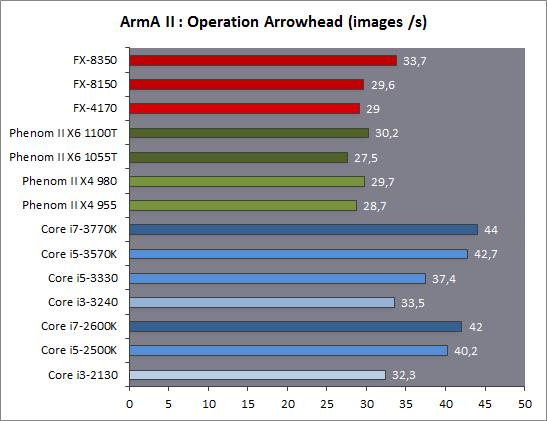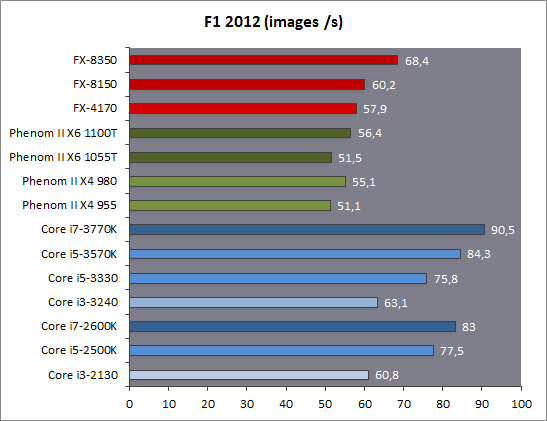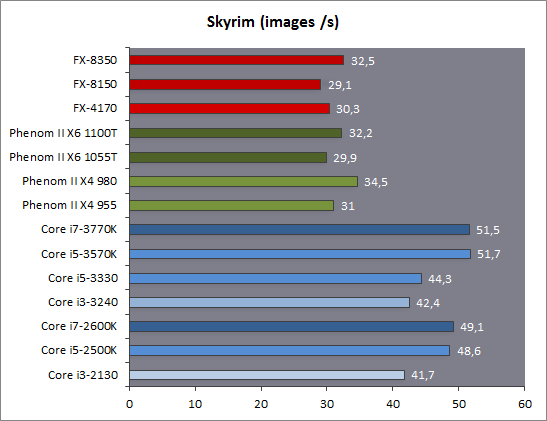Hello! I'm intrigued as to what people prefer and why. I'm currently with AMD, as their processors offer better multi-threaded performance when compared with Intel's CPU's. Although, Intel processors have better single threaded performance, but I use a lot of programs both at the same time, and that do a huge amount of multi-threading.
You are using an out of date browser. It may not display this or other websites correctly.
You should upgrade or use an alternative browser.
You should upgrade or use an alternative browser.
AMD or Intel?
- Thread starter stonarda
- Start date
Jad Chaar
Posts: 6,481 +976
I am pretty interested in AMD for my next build after the rumor today that next gen AMD CPUs will use GDDR5 onboard memory + DDR4
St1ckM4n
Posts: 2,887 +628
You've got that around the wrong way. With all features disabled, and only one core being used, at the same clock, AMD and Intel CPU's are on-par.
Intel shines in multi-threaded processing, hyperthreating, cache, everything - apart from graphics.
Intel shines in multi-threaded processing, hyperthreating, cache, everything - apart from graphics.
cliffordcooley
Posts: 13,141 +6,441
Here I was thinking AMD was lagging behind clock for clock per core. Which is why AMD was using more cores to make up the difference. Maybe I need to catch up on my reading.
St1ckM4n
Posts: 2,887 +628
Here I was thinking AMD was lagging behind clock for clock per core. Which is why AMD was using more cores to make up the difference. Maybe I need to catch up on my reading.
Not sure if sarcasm.. I do agree with your post somewhat - AMD is using more cores, because their quad-core chips are getting dominated.
But, in my post I mentioned only the one single core. I am pretty sure in this case that AMD is pretty much on par, if slightly behind (due to caches etc).
cliffordcooley
Posts: 13,141 +6,441
I don't think I do sarcasm very well, so if it's not plainly obvious its usually not.Not sure if sarcasm..
From what I have read, AMD is not as efficient as Intel per clock cycle. And because of this AMD uses a higher core count to make up for the loss of clock for clock efficiency. But then again as I suggested (which was sincere), I may need to do a bit more reading.
St1ckM4n
Posts: 2,887 +628
Maybe we both need to do a bit more reading.  Although I think we're talking about slightly different things. Yes, clock-for-clock AMD is generally slower, and core-for-core even more, but in terms of a single core being used they may be quite level...?
Although I think we're talking about slightly different things. Yes, clock-for-clock AMD is generally slower, and core-for-core even more, but in terms of a single core being used they may be quite level...?
I'mma go ahead and tag dividebyzero because I think he may have a thing or two to teach us, if he so wishes!
I'mma go ahead and tag dividebyzero because I think he may have a thing or two to teach us, if he so wishes!
dividebyzero
Posts: 4,840 +1,271
Thanks St1ckM4n - not too sure where to start !
To answer the OP's question...there's a lot of variables in play. Presently, AMD's processors (talking about the FX series for the most part) really require very optimized code to shine. Benchmarks, for the most part are oversimplifications of a complex data set made graphically easy to understand (Tom's periodic comparisons for example, or Hardware France's almost-every-cpu-in-existence historian's-porn ). Almost any real world usage is going to have to take into account multiple processes run concurrently (browser + AV + monitoring + various programs and startup utilities- Steam, mouse/kb gaming software, Adobe Flash etc etc), and very few sites run those kind of benchmarks (bit-tech's approach here).
Clifford's assertion of Intel's superior instructions per clock (IPC) is correct. AMD chose the approach of a long pipeline running at a faster clock to counter Intel's lead in IPC. Unfortunately each 2-core module in Bulldozer/Piledriver has shared resources which cannot be fully utilized by both cores at the same time. While integer performance is good, AMD suffer from shared floating point resources - along with high latency and a relatively inefficient cache....so, YMMV when it comes to what kind of performance you can expect (and in comparison to Intel) based upon what mix of applications are running. The more single thread programs with their inherent serial nature, the better Intel looks. If on the other hand, you run an esoteric mix of heavily multi-threaded/parallelized apps running concurrently, the AMD's comparison looks more favourable with Intel. Unfortunately for AMD, most code in daily use for consumers is weighted more towards the single thread.
A more in-depth analysis of the relative architectures can be found at Real World Tech. Dave Kanter's Bulldozer analysis,as well as Haswell.
 . Kaveri is the successor to the "Richland" series of APUs that are supposedly being launched this/next month.
. Kaveri is the successor to the "Richland" series of APUs that are supposedly being launched this/next month.
To answer the OP's question...there's a lot of variables in play. Presently, AMD's processors (talking about the FX series for the most part) really require very optimized code to shine. Benchmarks, for the most part are oversimplifications of a complex data set made graphically easy to understand (Tom's periodic comparisons for example, or Hardware France's almost-every-cpu-in-existence historian's-porn ). Almost any real world usage is going to have to take into account multiple processes run concurrently (browser + AV + monitoring + various programs and startup utilities- Steam, mouse/kb gaming software, Adobe Flash etc etc), and very few sites run those kind of benchmarks (bit-tech's approach here).
Clifford's assertion of Intel's superior instructions per clock (IPC) is correct. AMD chose the approach of a long pipeline running at a faster clock to counter Intel's lead in IPC. Unfortunately each 2-core module in Bulldozer/Piledriver has shared resources which cannot be fully utilized by both cores at the same time. While integer performance is good, AMD suffer from shared floating point resources - along with high latency and a relatively inefficient cache....so, YMMV when it comes to what kind of performance you can expect (and in comparison to Intel) based upon what mix of applications are running. The more single thread programs with their inherent serial nature, the better Intel looks. If on the other hand, you run an esoteric mix of heavily multi-threaded/parallelized apps running concurrently, the AMD's comparison looks more favourable with Intel. Unfortunately for AMD, most code in daily use for consumers is weighted more towards the single thread.
A more in-depth analysis of the relative architectures can be found at Real World Tech. Dave Kanter's Bulldozer analysis,as well as Haswell.
Technically the "CPUs" you've heard about are APUs (Kaveri), and that launch is near the years end (assuming the AMD timetable remains valid -I am pretty interested in AMD for my next build after the rumor today that next gen AMD CPUs will use GDDR5 onboard memory + DDR4
M
MrBlkfx1
Every time I read a post from DBZ I feel like I learn something lol.I learned something - thanks DBZ
SNGX1275
Posts: 10,615 +467
Technically the "CPUs" you've heard about are APUs (Kaveri), and that launch is near the years end (assuming the AMD timetable remains valid -. Kaveri is the successor to the "Richland" series of APUs that are supposedly being launched this/next month.
Hopefully I land a job soon, my main computer is using a 7 year old processor... Plus, I feel somewhat drawn to these "Richland" processors since I went to high school in a town named Richland.
I also use dBpoweramp regularly, having more than 2 cores to take flac down to mp3 would be awesome. (dBpoweramp does 1 file per core)
Jad Chaar
Posts: 6,481 +976
The Kaveri is rumored to use DDR4 and GDDR5.Hopefully I land a job soon, my main computer is using a 7 year old processor... Plus, I feel somewhat drawn to these "Richland" processors since I went to high school in a town named Richland.
I also use dBpoweramp regularly, having more than 2 cores to take flac down to mp3 would be awesome. (dBpoweramp does 1 file per core)
V
Vinnit Alex
tipstir
Posts: 2,873 +206
Once there was many CPU brands today INTEL and AMD still stand out. AMD was suppose to be cheaper they got around some methods in their CPU to make it as fast as INTEL. I have both here AMD is my favorite does the job, INTEL the same. Their GPU side wasn't that great now it seems it is in HD as AMD branded ATI combo working well. Right now there are still bottleneck with OS and software not running at 64-bit. There was talk to bring the OS to 128-bit but what's the point doing so if software is still be written in 32-bit code. 32 lanes vs 64 lanes then 128 lanes. 32 lanes is tight now. Browser should be 64 lanes but they're 32 lanes. Memory access is plagued by limits in the system has to manage all of these factors.
So faster CPU even a fast dual core can still jump around quad core and 6-8-cores or 12-cores more for business workstations and servers. dual core for most port and quad core if you want more muscle. CPU and Memory will just get better as I type this. Changes..
So faster CPU even a fast dual core can still jump around quad core and 6-8-cores or 12-cores more for business workstations and servers. dual core for most port and quad core if you want more muscle. CPU and Memory will just get better as I type this. Changes..
dividebyzero
Posts: 4,840 +1,271
All those other "brands", I presume you mean Cyrix, Intergraph, Fujitsu, Siemens, Intersil, Chips and Technologies, Texas Instruments, IBM (x86) and the like? They are ALL either Intel clones or are based on Intel design and IP.Once there was many CPU brands today INTEL and AMD still stand out.
AMD were cheaper because they were licencing Intel designs and were later to market. The AMD CPUs were faster because 1. they had to be to compete, and 2. AMDs foundry model stressed quality in silicon productionAMD was suppose to be cheaper they got around some methods in their CPU to make it as fast as INTEL.
Nah. Don't know where you got that idea from, but the biggest bottleneck is that software always lags behind hardware...but its nor OS environment- virtually all code relies upon the SSE instruction sets, whereas the newer CPUs are capable of more complex multithreaded ISA's such as AVX and FMA. So, until more code takes advantage of the inherent abilities of theses new processors, their full potential isn't realized.Right now there are still bottleneck with OS and software not running at 64-bit. There was talk to bring the OS to 128-bit but what's the point doing so if software is still be written in 32-bit code. 32 lanes vs 64 lanes then 128 lanes. 32 lanes is tight now. Browser should be 64 lanes but they're 32 lanes. Memory access is plagued by limits in the system has to manage all of these factors
milostuvic
Posts: 23 +4
Intel vs AMD. Low end I mean for cheaper processors AMD wins (C, E, A series). As for the high end Intel is much better (the I series is great i3, i5, i7), but with most Intel processors you will need a dedicated graphics card.
fimbles
Posts: 1,194 +208
Tomb raider benchmarks:
https://www.techspot.com/review/645-tomb-raider-performance/page5.html
Intel 3770 k =80 FPS
AMD 8350 = 80 FPS
Intel price = £261.80
AMD price = £149.80
Intel is rapidly becoming a very expensive and overhyped choice in my opinion, Price per frame AMD wins hands down.
https://www.techspot.com/review/645-tomb-raider-performance/page5.html
Intel 3770 k =80 FPS
AMD 8350 = 80 FPS
Intel price = £261.80
AMD price = £149.80
Intel is rapidly becoming a very expensive and overhyped choice in my opinion, Price per frame AMD wins hands down.
cliffordcooley
Posts: 13,141 +6,441
Looks to me the game has a ceiling of 80FPS. Before you can make this statement, a comparison will need to be made without the ceiling.Intel is rapidly becoming a very expensive and overhyped choice in my opinion, Price per frame AMD wins hands down.
Edit:
I don't think that came out the way I meant for it too.
dividebyzero
Posts: 4,840 +1,271
Well, unless you're using the system solely for gaming, that hardly tells the whole story does it ?...and if you are only using the system for gaming then a 3570K or non-K lower tier i3 or i5 is a more sensible choice, since hyperthreading isn't utilized much (if at all) in gaming....[cherry picked benchmark]....Intel is rapidly becoming a very expensive and overhyped choice in my opinion, Price per frame AMD wins hands down.
Maybe should also note gaming that relies on CPU compute power (as opposed to be being GPU bound) doesn't favour AMD too heavily:
Hitman: Absolution 16% faster with 3470 ($200) than FX 8350 ($200)
...ArmA II : Operation Arrowhead...

F1 2012...

TESV: Skyrim...

[Hardware France]
Jad Chaar
Posts: 6,481 +976
You dont need a graphics card. It is just that people who usually buy Intels dont have such a strict budget. But at the same time, if someone is building a system for gaming, they will need a graphics card regardless.Intel vs AMD. Low end I mean for cheaper processors AMD wins (C, E, A series). As for the high end Intel is much better (the I series is great i3, i5, i7), but with most Intel processors you will need a dedicated graphics card.
fimbles
Posts: 1,194 +208
Well, unless you're using the system solely for gaming, that hardly tells the whole story does it ?...and if you are only using the system for gaming then a 3570K or non-K lower tier i3 or i5 is a more sensible choice, since hyperthreading isn't utilized much (if at all) in gaming.
Maybe should also note gaming that relies on CPU compute power (as opposed to be being GPU bound) doesn't favour AMD too heavily:
Hitman: Absolution 16% faster with 3470 ($200) than FX 8350 ($200)
...ArmA II : Operation Arrowhead...

F1 2012...

TESV: Skyrim...

[Hardware France]
I think a lot of those results are skewed (particulary skyrim) by poor core utilisation.
As for applications other than gaming, in cinebench its a pretty similar result, the amd,s perform very similary to much more expensive intels.
Not to mention the whole " antitrust" situation.
http://www.agner.org/optimize/blog/read.php?I=49#216
Similar threads
- Replies
- 23
- Views
- 506
- Replies
- 15
- Views
- 217
Latest posts
-
Apple Vision Pro is facing declining interest and sales among consumers
- The Talking Tech replied
-
SuperAntiSpyware problem
- learninmypc replied
-
Mercedes-Benz becomes first automaker to sell Level 3 autonomous vehicles in the US
- maxxcool7421 replied